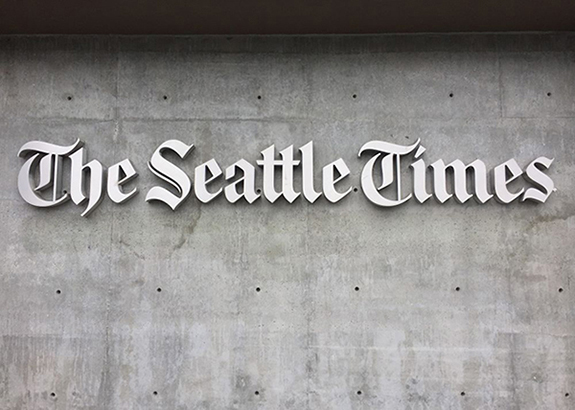Pub. Note: Perhaps because it’s happening right under our collective noses, there has been too little appreciation for the innovative and leading-edge approach that Seattle Times publisher Frank Blethen has employed to supplement sagging revenues: corporate and philanthropic sponsorships. From a journalistic standpoint, the genius of the approach is that there has been no hint of the contributors having any degree of undue influence on the print and online editorial content.
Blethen was chosen as Editor & Publisher’s 2020 Publisher of the Year for his work in advocating for local journalism. Here is his Message from the Publisher that appeared in The Times on Friday, May 14.
By Frank Blethen
What started out as an experiment to stop the decade-long defunding of our state’s higher education system has become a significant new revenue stream in the newspaper/digital news and information world. The Seattle Times is the only print and digital news organization to make community funding such a high priority.
Like the rest of the news industry, The Times suffered significant revenue losses over the last decade due to Big Tech’s unfair monopolization of the advertising and search markets, along with its unfettered and uncompensated use of our highly valued content. These abuses have put our nation’s local news system on life support, threatening our democracy.
In 2011, the governor and state Legislature were preparing to cut higher education budgets for the 10th year in a row. This would have been a devastating blow to both access to and the quality of higher education in our state. The impact would have been greatest on people of color and those most in need of the support necessary to gain the skills for living-wage employment. The damage would be felt throughout the system of four-year colleges, community colleges and vocational schools.
Providing greater access to quality public education, and eradicating its inequities, has been a guiding principle of the Blethen family and The Seattle Times for more than 100 years. It drives our economy and is key to social equity. We knew we had an obligation to use our voice to empower the community to end this inexcusable disinvestment. Yet we were in the depths of the Great Recession, without the resources to put an intense spotlight on the pending demise of our state’s once-vaunted higher-education system.
We had to get creative, so we launched a “public-service voice.” We then turned to the community to see if we could find enough support to use that new voice to mount an effective public-service campaign.
We were surprised at how quickly community support materialized and by the effectiveness of the six-month campaign. Both the Legislature and governor dropped their budget-cut proposals and actually increased higher-education funding for the first time in a decade. It has been increased every year since.
The campaign’s benefactors were Davis Wright Tremaine, Safeco, Microsoft, The Bellevue Collection/Kemper Freeman, Rowley Properties/Skip Rowley, Boeing and the Blethen family.
The campaign’s success emboldened us to approach the Bill & Melinda Gates Foundation to fund a journalism team dedicated solely to education coverage. The foundation was receptive and, in October 2013, Education Lab was launched. The lab has had a profound impact on our public K-12 system and has been a model for news organizations around the country. Ed Lab is still going strong after seven years thanks to the continued support of the Gates Foundation and, in more recent years, City University, Comcast Washington and Amazon.
Our success has led to a series of community-funded labs and initiatives, including Traffic Lab, launched in 2016; Project Homeless, launched in 2017; and the Investigative Journalism Fund, launched in 2019.
Project Homeless was our first initiative prompted by the community, and has received funding from Vulcan/Paul G. Allen Family Foundation, Starbucks, Raikes Foundation, Gates Foundation, Campion Foundation and Seattle Foundation.
And we are pleased to announce two more community-funded initiatives that will launch this Summer: One that is focused on expanding local news coverage, funded by Microsoft Philanthropies, and another that will be announced shortly.
The local-news initiative is an incredible civic statement. Nowhere else in the country is there this level of community support for the local free press.
All told, we have more than 800 individuals and entities directly providing community support for public-service journalism. Support from individuals has ranged from $10 to $100,000. Businesses and foundations generally provide multiyear funding that can reach up to $1 million over two years.
This support is in addition to revenue from our print and digital subscriptions, where we are among the leading metropolitan newspapers in the country. Print readership remains very strong and our digital subscriptions have grown to more than 74,000. In fact, we are among the first metro newsrooms in the nation to have subscription income become our largest revenue stream.
Until the local free press system gets relief from Big Tech’s monopolistic advertising and search abuses, local newspapers, including The Seattle Times, will struggle to maintain adequate and relevant content.
Thanks to our subscribers and public-service funders, we have been able to somewhat minimize content and news staff reductions.
With the two new initiatives, community funding will be supporting newsroom positions we would not otherwise have.
To our community, we say thank you for this unprecedented support. We look forward to another decade of public-service journalism and the best metropolitan news coverage in the country.

Frank Blethen is publisher of The Seattle Times and the great-grandson of the 124-year-old company’s founder. He was inducted into the pantheon of MARKETING IMMORTALS in 2016.







Thank you Frank!
Comments are closed.